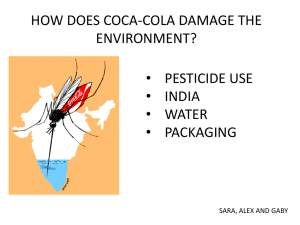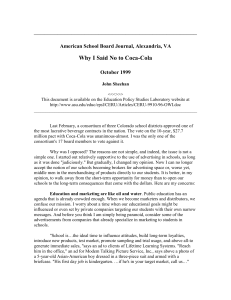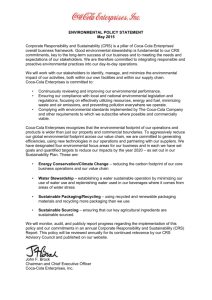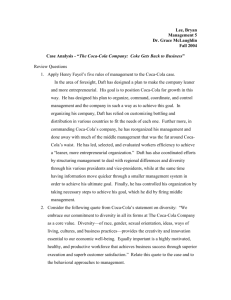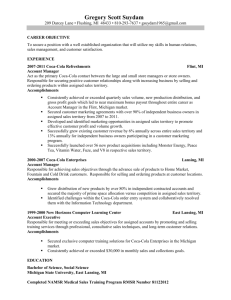The Coca-Cola Company is the world's largest beverage company
advertisement
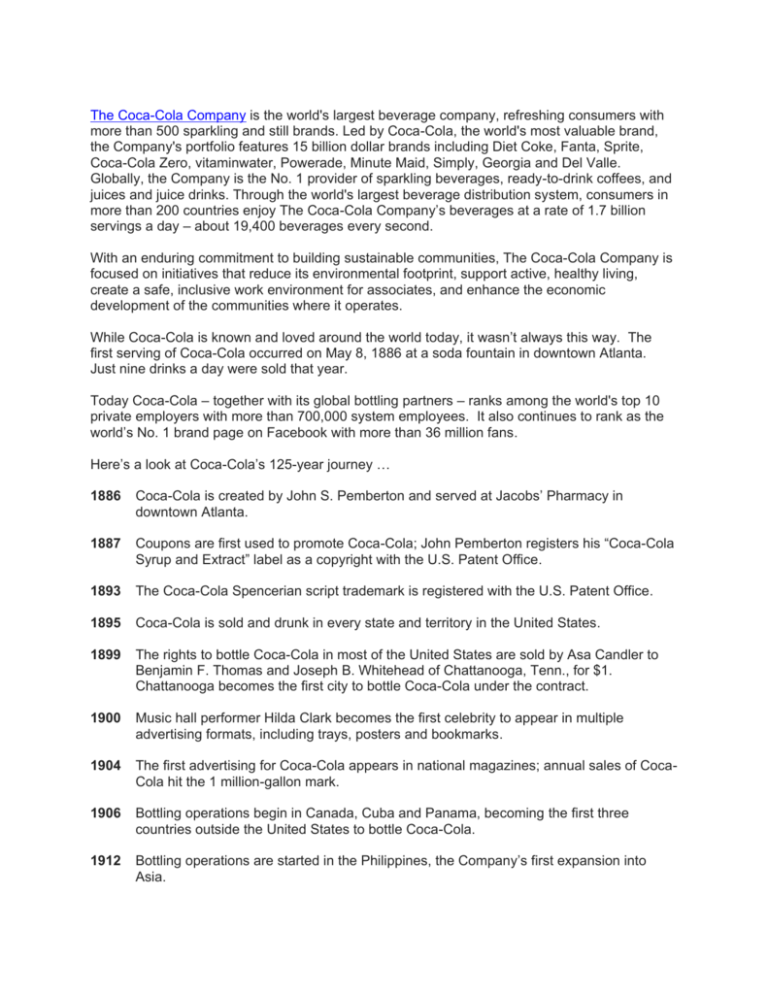
The Coca-Cola Company is the world's largest beverage company, refreshing consumers with more than 500 sparkling and still brands. Led by Coca-Cola, the world's most valuable brand, the Company's portfolio features 15 billion dollar brands including Diet Coke, Fanta, Sprite, Coca-Cola Zero, vitaminwater, Powerade, Minute Maid, Simply, Georgia and Del Valle. Globally, the Company is the No. 1 provider of sparkling beverages, ready-to-drink coffees, and juices and juice drinks. Through the world's largest beverage distribution system, consumers in more than 200 countries enjoy The Coca-Cola Company’s beverages at a rate of 1.7 billion servings a day – about 19,400 beverages every second. With an enduring commitment to building sustainable communities, The Coca-Cola Company is focused on initiatives that reduce its environmental footprint, support active, healthy living, create a safe, inclusive work environment for associates, and enhance the economic development of the communities where it operates. While Coca-Cola is known and loved around the world today, it wasn’t always this way. The first serving of Coca-Cola occurred on May 8, 1886 at a soda fountain in downtown Atlanta. Just nine drinks a day were sold that year. Today Coca-Cola – together with its global bottling partners – ranks among the world's top 10 private employers with more than 700,000 system employees. It also continues to rank as the world’s No. 1 brand page on Facebook with more than 36 million fans. Here’s a look at Coca-Cola’s 125-year journey … 1886 Coca-Cola is created by John S. Pemberton and served at Jacobs’ Pharmacy in downtown Atlanta. 1887 Coupons are first used to promote Coca-Cola; John Pemberton registers his “Coca-Cola Syrup and Extract” label as a copyright with the U.S. Patent Office. 1893 The Coca-Cola Spencerian script trademark is registered with the U.S. Patent Office. 1895 Coca-Cola is sold and drunk in every state and territory in the United States. 1899 The rights to bottle Coca-Cola in most of the United States are sold by Asa Candler to Benjamin F. Thomas and Joseph B. Whitehead of Chattanooga, Tenn., for $1. Chattanooga becomes the first city to bottle Coca-Cola under the contract. 1900 Music hall performer Hilda Clark becomes the first celebrity to appear in multiple advertising formats, including trays, posters and bookmarks. 1904 The first advertising for Coca-Cola appears in national magazines; annual sales of CocaCola hit the 1 million-gallon mark. 1906 Bottling operations begin in Canada, Cuba and Panama, becoming the first three countries outside the United States to bottle Coca-Cola. 1912 Bottling operations are started in the Philippines, the Company’s first expansion into Asia. 1915 Answering the call of The Coca-Cola Company, the contour bottle prototype is designed by Alexander Samuelson and patented by the Root Glass Company. It is approved by the Bottlers’ Association and becomes the standard bottle. 1919 The first bottling plants are opened in Europe in Paris and Bordeaux. 1923 The introduction of the first six-bottle carton is a significant innovation for the beverage industry. The carton is patented the following year. 1925 The Board of Directors passes a resolution placing the secret formula for Coca-Cola in a bank vault at the Trust Company Bank in Atlanta. 1926 The Coca-Cola Foreign Department is formed to supply concentrate to overseas bottlers. Some of the countries where bottling operations begin during this decade include Belgium, Bermuda, China, Colombia, Germany, Haiti, Italy, Mexico, the Netherlands and Spain. 1928 The Company begins its long-time association with the Olympic Games by supplying drinks from kiosks surrounding the venues in Amsterdam. 1931 Seeking to create an advertising program that links Coca-Cola with Christmas, artists Haddon Sundblom creates his first illustration showing Santa Claus pausing for a Coke. For the next three decades, Sundblom paints images of Santa that help to create the modern interpretation of St. Nick. 1943 The U.S. government requests that Coca-Cola be made available to the troops. The Company pledges to provide Coke to the military for a nickel regardless of what it costs to produce the product. During the war, 64 portable bottling plants are sent to Asia, Europe and North Africa. More than 5 billion bottles of Coca-Cola are distributed. 1950 Coca-Cola becomes the first product to appear on the cover of Time magazine. The magazine wants to have a photo of Robert Woodruff on the cover, but he refuses stating that the product is the only important element in the Company. 1955 Fanta Orange is introduced in Naples, Italy, the first new product to be distributed by the Company. The Fanta line of flavored beverages comes to the United States in 1960. 1960 The Coca-Cola Company acquires The Minute Maid Corporation, adding a line of juice products to its portfolio. 1963 TaB, the first diet product produced by the Company, is launched. 1971 First introduced as a radio ad and later produced as a television commercial, “I’d Like to Buy the World a Coke” becomes an international hit and remains one of the most popular ads for Coca-Cola. 1978 Coca-Cola signs an agreement to reenter the China market after a nearly 30-year absence; the 2-liter polyethylene terephthalate (PET) bottle is introduced, beginning the Company’s use of PET packaging. 1979 The “Mean Joe Green” television commercial debuts. The ad is consistently voted one of the best commercials of all time. 1982 Diet Coke is introduced in a celebrity-filled ceremony in New York, becoming the first extension of the trademarks of Coca-Cola and Coke. 1985 The formula for Coca-Cola is changed for the first time in 99 years. The product, popularly dubbed “New Coke,” generated consumer protest nationwide. Product made with the original formula, renamed “Coca-Cola Classic,” is returned to the market 79 days later; Coca-Cola becomes the first soft drink consumed in space when the astronauts aboard the space shuttle Challenger tested the space can on a mission. 1992 Powerade is introduced and is designated as the official sports drink of the Olympic Games. 1993 The Company reenters India after leaving the country in 1977 rather than reveal the secret formula for Coca-Cola. 2001 Simply Orange, a not-from-concentrate orange juice, is introduced. 2002 “American Idol,” a singing competition sponsored by Coca-Cola, debuts. It becomes one of the most popular shows in the history of television. 2005 Coca-Cola Zero, a zero-calorie cola, makes its debut. 2008 A Coca-Cola Facebook page is established by two fans. It becomes the most popular brand fan page on Facbeook. 2009 Coca-Cola Freestyle, an innovative fountain dispenser that allows consumers to select from more than 100 beverages, is unveiled; PlantBottle PET packaging is introduced. 2011 The Coca-Cola Company celebrates 125 years of brand Coca-Cola; for the first time in 86 years, the Coca-Cola secret formula is moved to the World of Coca-Cola in Atlanta making the vault containing the secret formula visible to the public.

